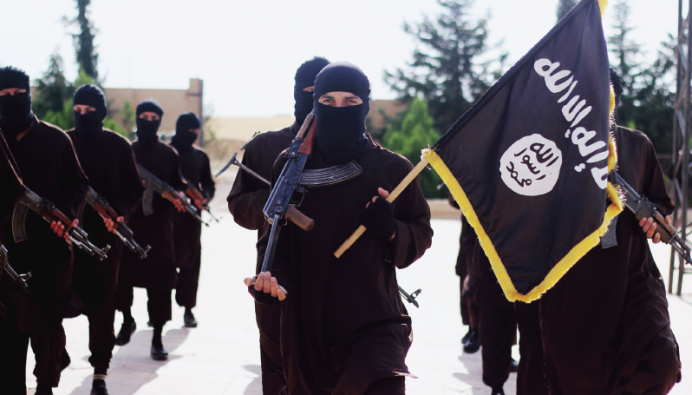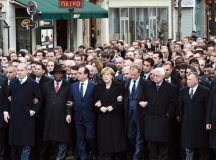Dave Rich of the Community Security Trust argues that while IS has the support of only small minorities amongst Muslim populations in the Middle East and Europe, it has a clear political genealogy that builds on a history of Islamist politics and jihadist violence. The ‘not in my name’ response to IS from Muslim organisations is necessary and genuine, but it fails to directly and openly challenge the Islamist political culture of which IS is the latest and most extreme manifestation, and which – in the form of the idealisation of jihad and the utopian vision of a Caliphate as a system of government – put down deep roots in the UK during the 1990s.
In the Summer of 2014, when Islamic State (IS) forces conquered the northern Iraqi city of Mosul, the jihadist fighters faced the question of what to do with about 1,500 prisoners who were left in the city’s Badoush prison when its guards had fled the day before. Their solution was to put the prisoners on trucks and drive them out of town before systematically separating the Sunni prisoners from the others, who were mostly Shia Muslims but included a small number of Kurdish and Yazidi prisoners. These mostly Shia men, numbering approximately 670 or so, were then lined up on the edge of a ravine and shot in the head, one by one.
As IS pushed north from Mosul to capture Yazidi villages on the approaches to Mount Sinjar, they dealt with the Yazidis who fell under their control in a similarly systematic way. First, men and women were separated. All Yazidi men over the age of puberty were taken from their villages into the countryside and machine gunned en masse. The women were then separated by age: elderly women were also shot, and the rest – women and girls – were kept captive as sex slaves for IS’s paedophiles and rapists. The mass graves from some of these killings are now being unearthed following the Kurdish liberation of Sinjar.
I normally abhor historical comparisons to World War Two and political comparisons with the Nazis, but in this specific case I will make an exception: this systematic selection, separation and mass murder of Shia Muslims, Yazidis and other minorities is reminiscent of the Einsatzgruppen, the mobile killing units which followed the German invasion of the Soviet Union in 1941 and shot to death over a million Jews in Nazi-conquered territory over the following two years.
Seeing IS Plain
IS is not identical to Nazi Germany and its jihadist ideology has many differences from Nazism. It is not as economically developed, technologically advanced or cultured and its genocidal killings are much smaller and cruder than the industrial extermination of Jews at Auschwitz and other Nazi death camps. This may have more to do with circumstance than any lack of ambition. IS’s claim that the Paris attacks targeted ‘the capital of prostitution and vice’ has a sense of moral purification which echoes Nazi hatred of degeneracy and sexual freedoms. After German journalist Jurgen Todenhofer spent 10 days with IS in Mosul in 2014, he returned convinced that the movement would slaughter millions if it could.
The murderous rampage in Paris, shortly following IS’s other terrorist outrages in Ankara, Beirut and Sharm el-Sheikh, has focused minds on how to respond to this new phenomenon. This debate has been as much about how to name and describe IS – part theocratic proto-state, part terrorist organisation, part millennial social movement – as about how to destroy it. Is IS really Islamic? Is it a State? Graeme Wood, in a much-read Atlantic essay, argued that, ‘The reality is that the Islamic State is Islamic. Very Islamic.’ Mehdi Hasan responded with a contrary opinion in the New Statesman: ‘To claim that Isis is Islamic is egregiously inaccurate and empirically unsustainable, not to mention insulting to the 1.6 billion non-violent adherents of Islam across the planet.’ The BBC has settled on the nomenclature of ‘so-called Islamic State’, as if to insert an editorial judgement that it is neither Islamic nor a State into its news reporting of its activities. The Muslim Council of Britain argues that, ‘The barbaric acts of Daesh (or ISIS, as they are sometimes known) have no sanction in the religion of Islam, which forbids terrorism and the targeting of innocents.’
This claim that IS is not in any meaningful way ‘Islamic’ is understandable. Most Muslims look at IS and see something which appears entirely alien to the religion that they practice and that they teach their children. They surely fear, with justification, that any identification of IS with Islam will fuel a backlash of anti-Muslim hatred. This potential backlash should concern non-Muslims and Muslims alike. The debate over how to understand and confront IS is necessary and urgent, and those who contribute to this debate need to find the right language to do so in ways which do not demonise all Muslims or deny them the space to express their own opposition to IS.
It is true that there are many and varied reasons why western Muslims have volunteered to join IS. Family and friendship networks play a role, as does a desire for identity, belonging and adventure. Grievances large and small, real and imagined, can also motivate recruits. However, none of these factors, alone or combined, can answer one simple question: if IS ‘has nothing to do with Islam’, as John Kerry remarked after Paris, why is it only Muslims who join?
One way to answer this question is by acknowledging that IS did not emerge sui generis. It has an identifiable political genealogy that can be traced back through Al-Qaeda; via Egyptian, Algerian and other jihadist insurgencies of the 1990s; to the formative ideas of the original Islamist organisation, the Muslim Brotherhood, and its south Asian equivalent, the Jamaat-e-Islami; and, through them, to the Islamic revivalist movements of the 19th century. These movements comprise the political history of Islamism; and while Islamism has a religious discourse and programme, it is at heart a political movement with a history of its own that now includes IS. Jihadism is its violent expression, although the comparison of IS to the Einstazgruppen does not apply to most Islamists. While most Islamists are not violent, few reject the use of violence on principle and in every circumstance. The political diversity within Islamism includes those groups that participate in democratic elections; those that shun democracy in favour of violence, either on practical or doctrinal grounds; and those that, at different times, use both. The Islamist debate over violent jihad tends to be a contingent one concerning where, when and how it is justified.
In addition, some of IS’s political and religious ideas – about religious freedom, for example, or about homosexuality and gender equality – are normative in many (although not all) Muslim-majority societies. The ‘crime’ of choosing to leave Islam is a capital offence in Afghanistan, Brunei, Mauritania, Qatar, Saudi Arabia, Sudan, the United Arab Emirates and Yemen. This notion of apostasy is also used in several jurisdictions to punish ‘blasphemy’; which is itself an elastic concept. IS only has the support of small minorities amongst Muslim populations in the Middle East and Europe, but some of its ideas are recognisable adaptations, albeit applied in the most extreme form, of political and religious norms amongst those populations.
Even the fervour for apocalypse that energises IS’s killings can also be found in mainstream Islamism. Sheikh Yusuf al-Qaradawi, perhaps the most important theological authority for the Muslim Brotherhood, has written of how a final battle between Muslims and Jews is one of the preconditions that needs to be fulfilled before the Day of Judgement can come. It is an apocalyptic battle that he welcomes.
Islamist political culture and the UK
The ‘not in my name’ response to IS from Muslim organisations does not address this problem. It is a message designed for non-Muslim audiences: a necessary, powerful and genuine message, for sure, but not one that directly and openly challenges the Islamist political culture of which IS is the latest and most extreme manifestation. This political culture put down deep roots in the UK during the 1990s. During that decade, the idea spread that British Muslims should be free to fight in overseas jihads and that those who did so were expressing the highest ideals of Muslim political engagement. The desire at that time to help Muslims in Bosnia, for example, was understandable, but most of those involved naively failed to see how this would rebound on British Muslims. Foolishly, even the police and security services failed to grasp the connection between foreign jihads and domestic terrorism until far too late. The numbers that actually went to fight in Kashmir, Bosnia or elsewhere were in the hundreds, but approval of their actions went far wider.
This idealisation of the concept and practice of jihad as a form of Muslim political activism was not limited to fringe organisations. For example, in March 2001 the Muslim Council of Britain (MCB) criticised the government for proscribing 21 foreign terrorist organisations, because the list included various Islamist groups including Al-Qaeda, Hamas, Hezbollah, the Kashmiri Harakat Mujahideen and other ‘legitimate resistance movements’, as the MCB called them. To ban them ‘erodes civil liberties and knocks community relations off-course’, the MCB said at the time. Fast forward to 2015 and the MCB has warned that the new counter-extremism strategy will ‘perpetuate further alienation of the community’ and ‘restrict freedom of thought and expression.’ Plus ça change. The specifics of the MCB’s position have changed – they certainly would not defend membership of Al-Qaeda today – but their thinking betrays a consistent desire to establish clear blue water between efforts to combat the violent jihadists of IS or Al-Qaeda and opposition to Islamist politics in general. The latter are never directly confronted and rejected.
Back in 2001 the Islamic Human Rights Commission (IHRC) was even more brazen, complaining, just a few days before 9/11, that British counter-terrorist legislation targeted ‘those who want to attack, however legitimately, US or British interests overseas.’ Neither the MCB nor the IHRC is involved in violence and both would automatically condemn IS terrorism of the sort seen in Paris; but just ponder that ‘however legitimately’ for a moment.
British Islamists have had a particular impact on attitudes towards Israel and Palestine, which was an issue of marginal interest for most British Muslims before the 1990s. In 1993 and 1994, when peace talks between the Israeli government and the Palestine Liberation Organisation (PLO) produced the Oslo Accord and the possibility of a solution to the Israeli-Palestinian conflict, all of Britain’s Islamist organisations objected to the very idea of a peace treaty between Israel and the Palestinians. This led to the bizarre sight of the Islamist organisation Hizb ut-Tahrir demonstrating outside the offices of the Board of Deputies of British Jews while Britain’s Jewish leadership met Yasser Arafat on a visit to London.
Trends magazine, published by Young Muslims UK (one of the main Jamaat-e-Islami youth organisations at that time), devoted most of an issue to support for Hamas shortly after the Oslo Accord was signed. This included a two-page interview with a Hamas spokesman and an article called ‘The Palestinian Holocaust’. Another article dismissed the Oslo Accords as a ‘sellout’ only supported by ‘secular apologists’ and praised Hamas for rejecting it. The centrefold was a pull-out poster with a map of Palestine including all of Israel, an AK-47 rifle and (showing how little has changed in 20 years) a drawing of the Dome of the Rock. The poster had originally appeared in the Hamas magazine Filisteen alMuslima.
It is worth remembering that British suicide bombers struck in Tel Aviv on behalf of Hamas two years before they attacked London for Al-Qaeda. Jihadism tends not to respect national boundaries.
There are familiar names on the editorial and staff list of that issue of Trends, and on others from the same period that eulogised other Islamist leaders and movements. Several have gone on to have prominent careers in the Muslim community and in wider public life. No doubt some of them have changed their views in the intervening decades: this was a youth magazine, after all. At least one is now involved in government counter-extremist work. I expect that none of them support IS and that all are repulsed by its genocidal killings or its terrorism. But the fact that so many high-profile Muslim political activists cut their political teeth in that Islamist world is an indication of how deep-rooted this political culture is. Innes Bowen described the Jamaat-e-Islami as ‘British Islam’s political class’ for good reason. The Jamaat has also been implicated in war crimes – including genocide – during the 1971 Bangladeshi War of Independence. Few who came through British Jamaat-e-Islami organisations have publicly repudiated Islamism in the way that the former Islamists at the Quilliam Foundation and elsewhere have.
This idealisation of jihad has been accompanied by the utopian vision of a Caliphate as a system of government. Protests that IS is neither Islamic nor a State sometimes feel uncomfortably like an effort to deflect debate away from this particular concept, so that the theoretical ideal of a Caliphate is not damaged by its current realisation in Mesopotamia. Both ideas, of jihad and Caliphate, are underpinned by the primary identity of Muslims is as part of the worldwide Ummah, not their countries of birth or residence (this idea is also shared by Islamophobes).
These three concepts – violent jihad, Caliphate and the primacy of the Ummah – are the three main principles of Islamist politics. Their importance is seen in the reluctance of most British Islamists to let them go, even after the 9/11 and 7/7 terrorist attacks ended the permissive environment of the 1990s in which British jihadism had developed. Some even defended the right of British Muslims to fight against British forces in Iraq and Afghanistan, no doubt encouraged by their new friends on the irresponsible far Left who lauded IS’s precursor in Iraq as an honourable ‘resistance’ against foreign occupation.
Crucially, these political ideas of jihad and Caliphate are defined by some Islamists as core religious beliefs of Islam. At a meeting in Manchester last year to oppose government counter-extremist efforts, Hizb ut-Tahrir’s Reza Pankhurst said: ‘Who told us about Khilafah? Who told us about one Ummah? Who told us about jihad? Who told us about Sharia dress code? Was it not Allah and His Messenger? If Rasulah didn’t compromise Islam then it is not on us to compromise. This is the same war that Rasulah went through.’
Moazzam Begg from CAGE, perhaps the foremost proponents of this jihadist political culture in the UK today, erased any difference between Islam and Islamism by suggesting that government counter-extremist policies are designed to eradicate Islam itself: ‘Britain has truly taken a new turn in its persecution of religious minorities, especially Muslims … This war against Islam and Muslims transcends borders and continents, unlike any other war against any other group. They wish to extinguish the light of Islam.’
More recently, after the Paris attacks, CAGE’s Director Adnan Siddiqui told the Home Affairs Committee of the UK parliament that ‘the concept of jihad is an important concept’ and that the Ottoman Caliphate is his preferred system of government.
As with all politics, this Islamist politics carries on while most of the people in whose name it presumes to speak ignore it and get on with their daily lives. Most Muslims are not interested in any practical sense in recreating a mythical Caliphate or going to fight jihad. Islamism operates in the institutions and political organisations in British Muslim communities, and in those environments it has a strong presence. Some of those involved in creating this political culture in the 1990s now understand and regret the damage they have done. Abu Muntasir, one of the main organisers of British jihadis fighting overseas in the 1990s, famously broke down in tears at a public meeting in London after 7/7 because he understood the role he had played in creating the political culture from which that terrorist attack emerged. Ghayasuddin Siddiqui, a former supporter of the Jamaat-e-Islami and of Ayatollah Khomeini’s revolutionary ideology, now says that ‘political Islam … has put us on a road to destruction.’ There are many more Muslim voices speaking against this Islamist politics today than there were in the 1990s, including those of a younger generation, and there are several Muslim organisations actively working to reduce its influence. Beyond their efforts, though, there has not yet been a fundamental re-evaluation of Islamist politics and its relationship to jihadist violence; nor is there a broad, grassroots campaign that can translate well-meaning statements into sustained political activism within Muslim communities.
To return to the Einsatzgruppen analogy, after World War Two, and particularly after the Holocaust, the question of how Western political thought had led to fascism and Nazism became a subject of intense study. Political theorists, philosophers, sociologists, historians and other disciplines devoted much time and thought to this question. Art and literature also played their part, despite (or perhaps because of) Theodore Adorno’s dictum that, ‘To write poetry after Auschwitz is barbaric.’ This all contributed to a profound change in European attitudes to nationalism, racism, militarism and the rights of minorities. Again, it is important to state that IS’s crimes are not identical to those of the Nazis. Analogy is not synonymy. But there is no need to wait and see whether or not IS acquires the power to commit crimes on that scale, before addressing the roots and the reach of the ideas that underpin its existence. I can understand why people resist the idea that Islam needs a religious reformation before Islamism can be defeated. More urgent, perhaps, would be a period of meaningful introspection about the history of Islamist politics and the ideas in Muslim political thought that have found their apogee in this latest version of an Islamic State.




































